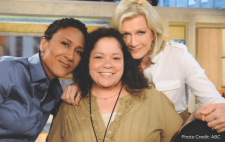Photo by David Michael Howarth
After 35 years as a war correspondent for NBC News, Martin Fletcher realized the people he had interviewed and filmed along the way had left a lasting mark on him. He shows those photos and tells their stories in his latest book, “Teachers: The ones I can’t forget.” Fletcher sat down with SJ Mag Media’s Marianne Aleardi to talk about his book – and career – during Katz JCC’s annual Festival of Arts, Books and Culture.
Q: What made you write the book?
I didn’t want to write a book – I had written 6 books before. I wanted to create images that would evoke an emotion in the same way a painting does. I did that privately, and I didn’t think anybody would be interested. But then I had an exhibition of 11 images at Christie’s in New York, and then it was shown in Miami, Houston and L.A. It just took off.
At first, I didn’t want to explain anything about the images. When you see a painting, you don’t tap the painter on the shoulder and say, “What’s that all about?” But because the images are journalistic in nature, everybody said, “Well, what is it? What’s that picture?” So I wrote one paragraph, and then I just kept going and it sort of poured out of me. Each chapter in the book begins with one of the images from the exhibit. Of all my books, this is by far the most personal and intimate.
Q: Where did the images come from?
They were freeze frames from stories I had done for NBC Nightly News or The Today Show that were especially meaningful to me. I learned a lot from these people I was meeting on the worst days of their lives – that’s why I call them my teachers.
Q: One of the photos in your book is of Evelyne. Can you talk about her?
Evelyne is a wonderful 8-year-old Ugandan girl whose parents died of AIDS, and she’s HIV positive. I met her in Kampala doing a story on AIDS and orphans. The breakthrough from her to me – look at her schoolbook. That’s what got me. Under “name of school,” this child had not written the name of her school, Kampala High. She just called it School of Sorrow. And for class, she hadn’t written Class of Geography or Mathematics. She had written Class of Hope. “School of Struggle, Class of Hope,” from an 8-year-old girl. That broke me up then and gives me a shiver now, the wisdom of such a child.
Q: You said when you were reporting you told a story in hopes of evoking an emotion from the viewer. If you were reporting on the Israeli-Gaza conflict today, what would that emotion be?
I want people to identify with the people I’m reporting on, and I think the way to do that is through emotions. I always look for: How can I convey the emotion in a story? If I was reporting in Gaza today, the emotion that is common to the Jews in Israel and the Arabs in Palestine would be pain. Pain. I would want to get to the heart of the pain that each side is experiencing.
Q: As a Jewish American journalist covering the Middle East, did you ever feel in danger?
I didn’t. I mean, there were dangerous moments where it could have gone either way, for sure. As a Jew, I always kind of felt like a kind of ambassador for the Jewish people when I was facing these kinds of Muslims – the people I met were terrorists. I once walked from Pakistan to Afghanistan for 3 weeks with Islamic fighters. We walked over the mountains, and it was incredible. Every night, they tried to convert me to Islam. And I was, “Look, I’m not interested. I’m perfectly happy being Jewish.” But it wasn’t an issue for them that I was Jewish. I’ve had many instances like that.
Q: All of the proceeds from your book are going to the nonprofit Art Illusion. What is that?
The reason I support Art Illusion is quite a good story from when I was in Somalia during the famine and the civil war. I was walking around filming, and this little boy was following me all the time. He had a distended stomach, and his hair was falling out. He was very, very sick in a place where people were dying of starvation and starvation-related diseases. I looked in my pocket and I had one sandwich left, so I offered him my sandwich, and he said he didn’t want it. I offered him my bottle of water, and he didn’t want that either. I said, “What does this kid want?” And someone said, “He wants your pencil.” I said, “Oh, sorry, I only got one pencil.” After that I thought: Why didn’t I give him my pencil? What a schmuck!
But I never forgot this kid, and then I came across 2 young artists who started Art Illusion to bring art to refugee camps around the world. They understood what I didn’t understand: that people need more than a sandwich and water and medicine, they need a reason to get up in the morning. Art Illusion brings art – and something exciting – to children in camps. I’ve supported them for over 10 years.
Q: Considering all that you’ve seen, can you ever have a bad day?
What could make me feel bad? I mean, everything that happens to me, I just shrug my shoulders and think, “Oh my God. It could be so much worse.”
Q: You’ve seen things we don’t even think about.
Yes, and my job was to make you think about it. My job was to go to places that people don’t go, meet people who don’t get recognized, and make this person here care about that person there. That’s exactly how I saw my work.
Q: Should we have hope for peace?
Well, I do. At some point, there has to be an understanding on both sides that peace is the only way forward. When people would ask, “When will there be peace?” I always said, “I have the exact answer.” When Israel understands the limits of its power, they’ll be ready to make peace. When the Palestinians realize that time is not on their side, they’ll be ready to make peace. Maybe that moment is coming at the end of this war.














